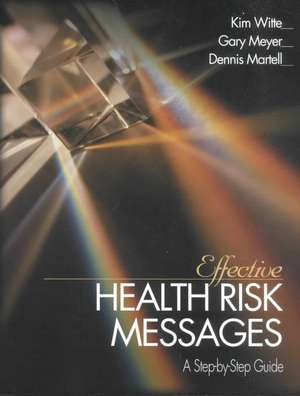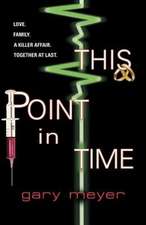Effective Health Risk Messages: A Step-By-Step Guide
Autor Kim Witte, Gary Meyer, Dennis P. Martellen Limba Engleză Paperback – 21 iun 2001
Effective Health Risk Messages provides step-by-step instructions for developing theoretically based campaigns that work. Students and readers will learn about message development theories, formative and summative evaluation, and even basic research designs for evaluating your campaign. Worksheets are provided at the end of each chapter to provide readers with hands-on, practical experiences in developing effective health risk messages. This book is suitable for practitioners, researchers, and students alike, and can act as a stand-alone text or supplementary text for persuasion, public health, advertising, and marketing classes.
| Toate formatele și edițiile | Preț | Express |
|---|---|---|
| Paperback (1) | 796.36 lei 6-8 săpt. | |
| SAGE Publications – 21 iun 2001 | 796.36 lei 6-8 săpt. | |
| Hardback (1) | 1103.59 lei 6-8 săpt. | |
| SAGE Publications – 21 iun 2001 | 1103.59 lei 6-8 săpt. |
Preț: 796.36 lei
Preț vechi: 971.18 lei
-18% Nou
Puncte Express: 1195
Preț estimativ în valută:
152.38€ • 159.67$ • 125.97£
152.38€ • 159.67$ • 125.97£
Carte tipărită la comandă
Livrare economică 11-25 aprilie
Preluare comenzi: 021 569.72.76
Specificații
ISBN-13: 9780761915096
ISBN-10: 0761915095
Pagini: 224
Dimensiuni: 216 x 279 x 12 mm
Greutate: 0.54 kg
Ediția:1
Editura: SAGE Publications
Colecția Sage Publications, Inc
Locul publicării:Thousand Oaks, United States
ISBN-10: 0761915095
Pagini: 224
Dimensiuni: 216 x 279 x 12 mm
Greutate: 0.54 kg
Ediția:1
Editura: SAGE Publications
Colecția Sage Publications, Inc
Locul publicării:Thousand Oaks, United States
Recenzii
"While library shelves are spilling over with books and manuals on designing effective campaign messages, few are as theoretically grounded and user friendly (a rare combination) as Effective Health Risk Messages: A Step-by-Step Guide..."
Cuprins
1. What Are Health Risk Messages?
Health Risk Messages Defined
What's a Theory?
The Components of a Fear Appeal
Explicit versus Implicit Messages
The Use of Culturally Based Colloquialisms
Types of Threats
Summary
2. History of Health Risk Messages: Fear Appeal Theories from 1953 to 1991
Fear-as-Acquired Drive Model
The Parallel Process Model
Protection Motivation Theory
Summary
Definitions
3. Putting It All Together
The Overall Model
The Depiction of the Model
Comparisons with Other Models
Research on the EPPM
4. Useful Concepts from Other Theories
The Health Belief Model
The Theory of Reasoned Action
Social-Cognitive Theory
Elaboration Likelihood Model
Stages of Change Model
Social Marketing
Summary
5. Starting Out the Right Way: Formative Research
Setting Goals and Objectives: The Campaign Plan
Formative Research
The Persuasive Health Message (PHM) Framework
Putting Transients and Constants Together
Gathering Information for the Persuasive Health Message Framework
Categorizing Audience Beliefs: A Chart to Guide Message Development
Conclusion
6. The Risk Behavior Diagnosis Scale
The Origin of the RBD Scale
Theoretical Basis for Expanding the EPPM
The RBD Scale
Tailored Health Risk Messages
Some Additional Guidelines
Conclusion
7. Out of the Tower and Into the Field
Using the RBD at a Campus Health Clinic: Background
Conclusion
8. Data Collection
Types of Evaluation
Gathering Data for the Evaluation
Data Collection Methods
Reliability and Validity
Sample Size
Summary
9. Data Analysis
Analyzing Data
Conclusion
10. Getting the Message Out
A Plan of Action
Message of Dissemination Issues
Specific Channels
Summary
Conclusion
Appendix
Glossary
Worksheets
References
Suggested Readings
Index
About the Authors
Health Risk Messages Defined
What's a Theory?
The Components of a Fear Appeal
Explicit versus Implicit Messages
The Use of Culturally Based Colloquialisms
Types of Threats
Summary
2. History of Health Risk Messages: Fear Appeal Theories from 1953 to 1991
Fear-as-Acquired Drive Model
The Parallel Process Model
Protection Motivation Theory
Summary
Definitions
3. Putting It All Together
The Overall Model
The Depiction of the Model
Comparisons with Other Models
Research on the EPPM
4. Useful Concepts from Other Theories
The Health Belief Model
The Theory of Reasoned Action
Social-Cognitive Theory
Elaboration Likelihood Model
Stages of Change Model
Social Marketing
Summary
5. Starting Out the Right Way: Formative Research
Setting Goals and Objectives: The Campaign Plan
Formative Research
The Persuasive Health Message (PHM) Framework
Putting Transients and Constants Together
Gathering Information for the Persuasive Health Message Framework
Categorizing Audience Beliefs: A Chart to Guide Message Development
Conclusion
6. The Risk Behavior Diagnosis Scale
The Origin of the RBD Scale
Theoretical Basis for Expanding the EPPM
The RBD Scale
Tailored Health Risk Messages
Some Additional Guidelines
Conclusion
7. Out of the Tower and Into the Field
Using the RBD at a Campus Health Clinic: Background
Conclusion
8. Data Collection
Types of Evaluation
Gathering Data for the Evaluation
Data Collection Methods
Reliability and Validity
Sample Size
Summary
9. Data Analysis
Analyzing Data
Conclusion
10. Getting the Message Out
A Plan of Action
Message of Dissemination Issues
Specific Channels
Summary
Conclusion
Appendix
Glossary
Worksheets
References
Suggested Readings
Index
About the Authors
Descriere
Winner of the Distinguished Book Award by the Applied Communication Division of the National Communication Association, 2001, (USA)








